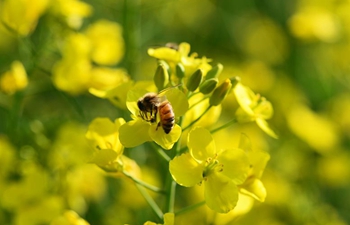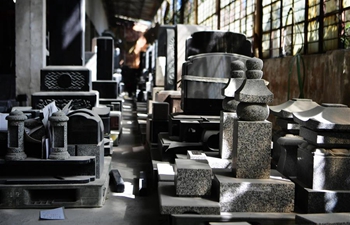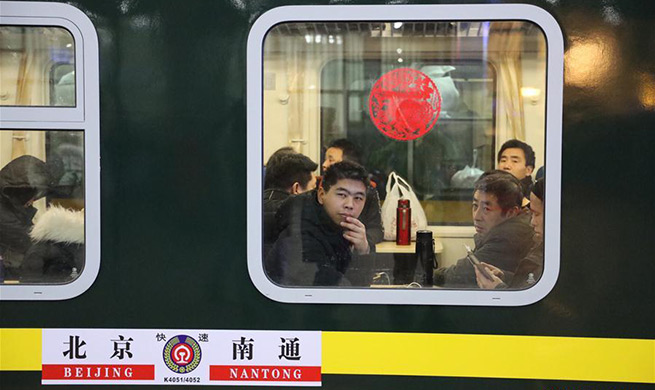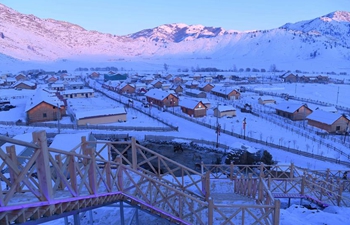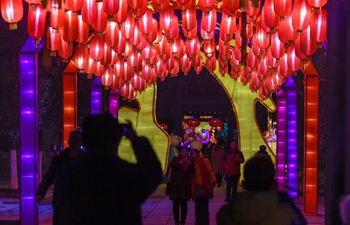NANNING, Jan. 21 (Xinhua) -- Temples, memorial archways and ancient, gray houses -- in the bustling city of Nanning, a historical district easily catches the public eye with its nostalgic impression.
"The place transcends time and space," said a user on microblog Sina Weibo, as the district recently caused quite a buzz on the Internet. "I feel like I'm in the old times."
The district is made of three main roads and two alleyways built almost 100 years ago. The Golden Lion Alleyway, the Silver Lion Alleyway, Xingning Road, Minsheng Road and Jiefang Road are known as the origin of the prosperity of Nanning, capital of southern China's Guangxi Zhuang Autonomous Region.
In the early 20th century, the three roads were the busiest, and the two alleyways were "the center of all centers."
"People who lived in the district's vicinity were the richest in the city," said a local resident. "Near the alleyways, people would come to make goldware and silverware; it was the lives of the rich and famous."
After a century of changes, Nanning has developed into a front gate for trade with ASEAN, but the old district's development gradually went into a slump. The houses were left decaying.
"The district basically became a slum," said Zhao Meizhu, who used to live in the Golden Lion Alleyway. Zhao said that the houses were too old to be fitted with natural gas facilities, so each household had to resort to coal gas. Electric wires were interwoven in the open air. Many families left their old houses for modern districts in Nanning, leaving the old district even more deserted.
Noticing the historic value of the district, the local government decided to transform it into a place of interest. Last year, they decided to build and renovate some houses but were determined to keep the nostalgic style intact.
"While some houses were rebuilt, the houses of 13 families kept their brick and wood structures, including mine," said 72-year-old Li Yanhao.
Li has been living in the Golden Lion Alleyway since he was seven years old. His children also grew up in the alley.
"The old alleyway is my hometown, so when I heard about the government's decision to transform it, I was quite anxious," Li said. "But I am glad that they returned the district to its original glory."
After months of renovation, the historical district experienced a facelift and opened to the public at the end of last year. Houses basically remained in the same style.
"The houses looked quite ragged in the past," Li said. "Now they are both new and nostalgic."
Some big, old houses were turned into museums, displaying distinctive cultures such as paper-cutting, the Zhuang ethnic embroidery and porcelain.
Many historic items remain. For instance, old walls with phrases like "stick to the principles of late marriage and late childbirth," which referred to the family-planning policy, are still in the district. Other phrases include "alter old customs" and "make funerals simple."
People often come to visit the district, with many wearing traditional Chinese Han-style clothes or qipao, to take pictures against the background of the classical buildings and streets.
After the district's renovation, Qin Yumei, a woman in her 80s, came back in memory of her teenage years as a medical school student in the 1950s.
"This place was once where I and my friends shopped and relaxed," Qin said. "It is amazing how they managed to recreate the atmosphere of the past."
Many local craftsmen continue to do business in the district after the renovation, including silverware businesswoman Wu Jinglan. Wu and her husband have been doing business in the Silver Lion Alleyway for 21 years.
"Business is getting better because we have more customers," Wu said. "We will stick with our business in the alley."
Li Wen, who participated in the renovation project, said that it is important to pass on history and culture.
"We need to keep the root from which our modernity thrived," Li said.








